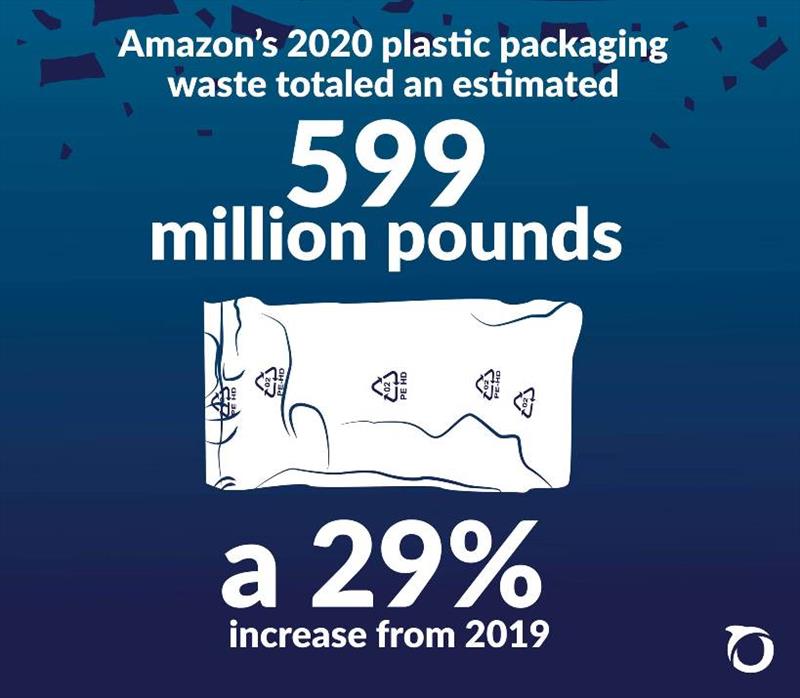
Oceana report - Plastic pollution from Amazon deliveries grows by 29% in just one year
by Oceana 16 Dec 2021 23:52 UTC

Plastic pollution from Amazon deliveries grows by 29% in just one year © Oceana
Today, Oceana released a report that reveals Amazon generated an estimated 599 million pounds of plastic packaging waste last year stemming from the billions of packages delivered by the company during the Covid pandemic.
This is a 29% increase over Oceana's 2019 estimates. Oceana also found, based on data from a peer-reviewed study on plastic waste pollution published in Science in 2020, that up to 23.5 million pounds of this plastic waste entered the world's waterways and seas. That is equivalent to dumping a delivery van's payload of plastic into the oceans every 67 minutes.i
"Our report found that Amazon's plastic packaging pollution problem is growing at a frightening rate at a time when the oceans need corporate leaders like Amazon to step up and meaningfully commit to reducing their use of single-use plastic. Amazon has shown it can do this in large markets like India and Germany. It now needs to commit to do so worldwide," notes Matt Littlejohn, Oceana's Senior Vice President for Strategic Initiatives.
Plastic is a major source of pollution and is devastating the world's oceans. Studies have estimated that for species, 55% percent of sea birds, 70% of marine mammals, and 100% of sea turtles have ingested or become entangled in plastic and have found that plastic film is one of the deadliest forms of plastic for marine life.ii,iii Scientific reports have estimated that only 9% of all plastic ever produced has been recycled.iv
Oceana has asked Amazon, which disputed Oceana's estimate last year, to provide data about its plastic footprint but Amazon has so far refused to do so. The amount of plastic packaging waste estimated to have been generated by Amazon would now, in the form of air pillows, circle the planet more than 600 times.
Secret shoppers expose Amazon's empty recycling promises
Amazon asserts that recycling can help solve its plastic packaging pollution problem, but Oceana's report found otherwise. Amazon plastic packaging falls into the category of 'plastic film' - a material that is extremely difficult to recycle and is not accepted at most curbside recycling programs in the U.S., the UK, and other large markets for Amazon.v Most often, it is landfilled, burned, or pollutes the environment, including the oceans.
To address this, Amazon directs customers who want to recycle their packaging to stores with designated drop-off locations through its Second Chance website. Oceana sent secret shoppers into 186 of these stores in 25 cities in the U.S. and the UK. Representatives from more than 40% of the stores visited told the secret shoppers they would not accept their Amazon plastic packaging and managers at more than 80% of stores visited did not know Amazon customers were being directed to their stores.
Oceana also surveyed 1,400 Amazon Prime customers in the same 25 cities and found widespread confusion and concern:
- 39% said that they put their Amazon plastic into municipal recycling bins, while 35.5% said they put their packaging into the trash - meaning the Amazon plastic packaging of three-quarters of those surveyed is ending up in landfills, incinerators, or the environment.
- 91% said Amazon should reduce its use of plastic packaging.
- 94.8% are concerned about plastic pollution's impact on the oceans.
In Germany and India, Amazon shows it is possible to reduce its use of plastic packaging
According to recent news accounts, Amazon plans to eliminate single use plastic packaging in Germany, one of the company's largest markets. Amazon ships hundreds of millions of packagesvi a year in Germany and has a market share of more than 50%vii. Amazon's elimination of single-use plastic packaging in India and its increased use of returnable and reusable packagingviii in that market are helping to reduce plastic pollution. If Amazon expands its plastic-free approach in India and Germany worldwide, it could substantially reduce its plastic footprint. However, transparency is key in these global efforts. Oceana found multiple examples of plastic packaging reaching Amazon customers in India despite the company's claims.
"Amazon is now bigger than Walmart,ix and is the largest retailer in the world outside of China. The company is now defining how products are packaged. It must stop hiding behind false and ineffective solutions, like plastic film recycling, and instead, do what it is doing in India and in Germany all around the planet. We're calling on Amazon to offer a plastic-free option at checkout - not just because their customers want it, but because our oceans need it," added Littlejohn.
Oceana's report calls on Amazon to reduce its plastic footprint and:
- Listen to its shareholders and be fully transparent: more than one-third of Amazon's shareholders asked the company to report on its plastic footprint. This data should be independently verified.
- Listen to its customers: more than 740,000 people have signed a petition asking Amazon for plastic-free choices.
- Eliminate plastic packaging, increase the number of products shipped in reusable containers, and adopt policies that demonstrably reduce plastic pollution rather than making empty claims about "recyclability."
Access the full Oceana report here. To find out about Oceana's campaign to reduce plastics, go to oceana.org/plastics